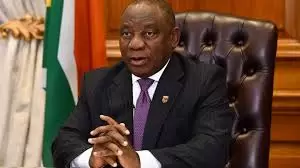

Last updated on September 11th, 2021 at 02:56 pm
President Cyril Ramaphosa and Health Minister Zweli Mkhize imposed on South Africa on the 27th of March, one of the strictest lockdowns outside of China to stop the spread of the coronavirus.
Among the activities prohibited are dog-walking, jogging, the sale of alcohol, and leaving a place of residence (except for emergencies). At the time restrictions were put in place, South Africa had around 1,000 cases and had just recorded its first deaths.
Though many at first did not heed the lockdown orders, the new rules have since been stringently enforced by the army and police. As in Kenya, there have been reports of South African security services using rubber bullets, whips, and beatings to enforce the lockdown.
As of April 4, at least three deaths have been attributed to security service brutality, and the defense minister condemned the heavy-handedness of soldiers.
South Africa’s record of protecting of human rights amid the coronavirus crisis has so far been mixed. As of April 7, it had 1,749 cases and 13 deaths, and the health minister acknowledged that testing must be vastly expanded to contain the outbreak effectively.
As of April 6, the total number of tests conducted [PDF] was 58,098, but South Africa’s National Health Laboratory service has plans to increase testing to 36,000 every day by the end of April.
According to the president, about 10,000 health workers have been mobilized to visit homes and screen residents for symptoms. This effort appears to be by far the greatest in Africa.
The health minister provides daily, forthright briefings that are perceived as credible. He warns that the crisis has hardly started.
Social distancing and hygiene are a challenge in the huge urban townships and informal settlements outside of South Africa’s big cities. Residents are poor, if not as poor as elsewhere in Africa, and, presumably, frightened; confrontation with the security services would seem to be all but inevitable.
For now, President Ramaphosa and his health minister are getting high marks. Since he became president in 2018, Ramaphosa has worked to establish his authority over the bitterly divided governing African National Congress (ANC), where the allies of discredited former President Jacob Zuma are still active in opposing his reforms.
If South African opinion leaders continue to see Ramaphosa as exerting strong leadership during this crisis, it will likely strengthen his hand within the ANC, and once the crisis is over, facilitate implementation of his reform program.
(CFR)
Africa is taking big steps by entering the global green technology manufacturing market to stop being just a supplier of…
Two mobile telecom leaders, MTN Group and Airtel Africa, joined forces to create a new digital infrastructure system throughout African…
South African President Cyril Ramaphosa defended his nation against claims of white discrimination made by tech magnate Elon Musk. After…
Hilton launched Signia by Hilton for its first appearance in Egypt and Africa through its hotel expansions. These hotels at…
UNICEF reported that, nearly 2900 people died of cholera across Eastern and Southern African countries while children suffer most greatly…
Enza, based in the United Arab Emirates, obtained $6.75 million in initial investment funding from Algebra Ventures and Quona Capital.…
This website uses cookies.